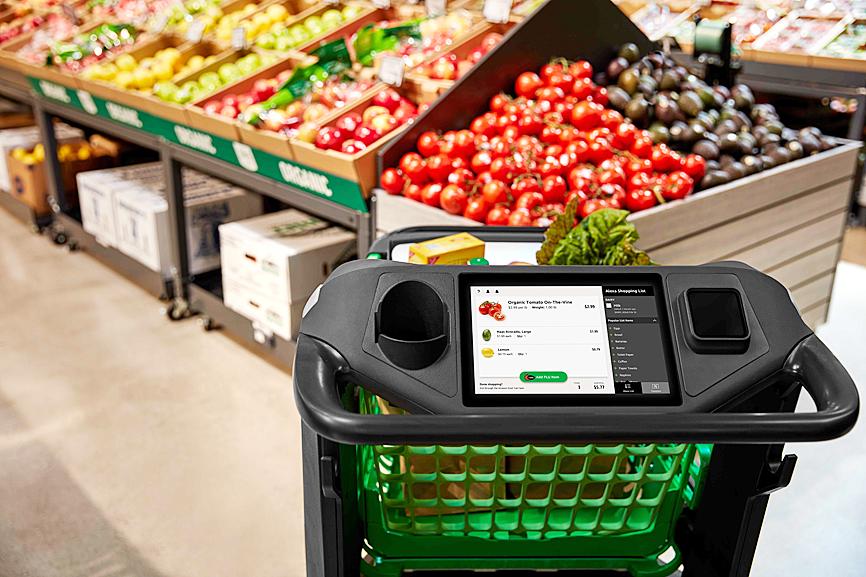Amazon.com Inc on Tuesday introduced a smart grocery cart that are to let shoppers skip checkout lines.
Amazon’s latest cashierless shopping innovation comes as merchants and customers strive to do business while reducing risk of exposure to COVID-19.
Dash Carts that use discretely embedded sensors and cameras to tally prices of items placed inside are to debut in an Amazon grocery store to open in southern California later this year.

Photo: AFP/AMAZON
“It’s a new smart shopping cart that makes a quick grocery trip even quicker by allowing you to skip the checkout line,” the technology titan, which owns the Whole Foods market chain, said in a post.
“When you’re done shopping, you’ll simply exit through the store’s Amazon Dash Cart lane, and your receipt will be e-mailed to you,” it said.
Each cart uses computer vision software and sensor data to identify what is put inside, showing a running total along with item descriptions and prices on a display, according to Amazon.
Using a Dash Cart requires a smartphone loaded with the Amazon application, which syncs by scanning a QR code and then charges the purchase to the credit card on file, the US-based company said.
Amazon early this year began offering its “just walk out” technology to other retailers in a move aimed at boosting the use of the cashierless store system.
“Just walk out technology enables shoppers to simply enter a store, grab what they want, and just go,” the Web site said.
The move came shortly after Amazon launched its first full-size grocery store in Seattle using the cashierless model.
Amazon has already opened more than 20 smaller Amazon Go stores using the same system, including in New York City, Chicago and San Francisco.
The Go stores allow pre-registered customers to skip the cashier and allow their credit cards to be billed for their purchases, with the technology detecting what they take and return to the shelves.

Sweeping policy changes under US Secretary of Health and Human Services Robert F. Kennedy Jr are having a chilling effect on vaccine makers as anti-vaccine rhetoric has turned into concrete changes in inoculation schedules and recommendations, investors and executives said. The administration of US President Donald Trump has in the past year upended vaccine recommendations, with the country last month ending its longstanding guidance that all children receive inoculations against flu, hepatitis A and other diseases. The unprecedented changes have led to diminished vaccine usage, hurt the investment case for some biotechs, and created a drag that would likely dent revenues and

Global semiconductor stocks advanced yesterday, as comments by Nvidia Corp chief executive officer Jensen Huang (黃仁勳) at Davos, Switzerland, helped reinforce investor enthusiasm for artificial intelligence (AI). Samsung Electronics Co gained as much as 5 percent to an all-time high, helping drive South Korea’s benchmark KOSPI above 5,000 for the first time. That came after the Philadelphia Semiconductor Index rose more than 3 percent to a fresh record on Wednesday, with a boost from Nvidia. The gains came amid broad risk-on trade after US President Donald Trump withdrew his threat of tariffs on some European nations over backing for Greenland. Huang further

CULPRITS: Factors that affected the slip included falling global crude oil prices, wait-and-see consumer attitudes due to US tariffs and a different Lunar New Year holiday schedule Taiwan’s retail sales ended a nine-year growth streak last year, slipping 0.2 percent from a year earlier as uncertainty over US tariff policies affected demand for durable goods, data released on Friday by the Ministry of Economic Affairs showed. Last year’s retail sales totaled NT$4.84 trillion (US$153.27 billion), down about NT$9.5 billion, or 0.2 percent, from 2024. Despite the decline, the figure was still the second-highest annual sales total on record. Ministry statistics department deputy head Chen Yu-fang (陳玉芳) said sales of cars, motorcycles and related products, which accounted for 17.4 percent of total retail rales last year, fell NT$68.1 billion, or

MediaTek Inc (聯發科) shares yesterday notched their best two-day rally on record, as investors flock to the Taiwanese chip designer on excitement over its tie-up with Google. The Taipei-listed stock jumped 8.59 percent, capping a two-session surge of 19 percent and closing at a fresh all-time high of NT$1,770. That extended a two-month rally on growing awareness of MediaTek’s work on Google’s tensor processing units (TPUs), which are chips used in artificial intelligence (AI) applications. It also highlights how fund managers faced with single-stock limits on their holding of market titan Taiwan Semiconductor Manufacturing Co (TSMC, 台積電) are diversifying into other AI-related firms.